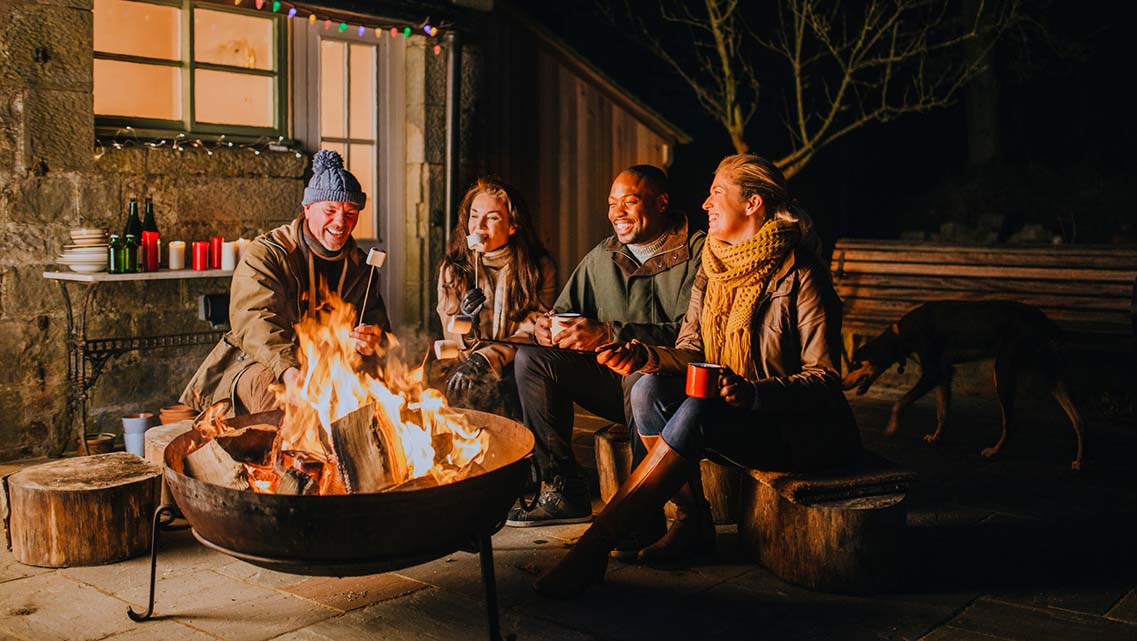Faith Popcorn, the trend guru who first used the word “cocooning” to describe the popularity of holing up in our homes to avoid the unpredictable realities of the outside world, is tossing around a new term these days: “clanning.” In Popcorn’s book Clicking: 16 Trends to Future Fit Your Life, Your Work, and Your Business, she defines clanning as “belonging to a group that represents common feelings, causes or ideals; validating one’s own belief system,” and she believes it’s making a comeback.
You don’t have to look very far to see she’s right. From book groups, Fantasy Football leagues and Thursday “Friends” nights to gourmet cooking and wine clubs, groups of people are getting together in each other’s homes to share their ideas, their enthusiasms, or even just share a laugh.
For some, in-home gatherings offer a calmer alternative to passing their precious downtime in noisy bars and clubs. But for many others, the drive is less a desire to “cocoon” than it is a hunger for more human contact – a shift from reaching in to reaching out. As Popcorn says, “All that huddling in the safety of our homes has made us want to reach out and connect to people of like kind it’s a rebound reaction to our overcommitted lives.”
On the practical side, in-home entertaining is also less expensive than a night out on the town making it much easier to focus on the fun at hand when you know your bank account isn’t going to suffer.
But the best aspect of in-home gatherings is always the people. Connecting with a group of people you like can be enormously satisfying, and surprisingly comforting. In Popcorn’s words, “Clanning reminds us of something very important: that we’re all on this planet together.”
The Joys of Joining Up
There are almost as many reasons to gather as there are groups. Generally, the more interactive and creative the group or gathering, the more it has to offer.
1. Sharing our interests gives us a sense of belonging.
Even if the interest is as simple as a favorite television show. Of course, debating the highs and lows of Jennifer Aniston’s hair or discussing Rob Lowe’s comeback on The West Wing isn’t going to win us awards for soulfulness, but it can certainly be an easy, low-key way to connect with others and keep the intricacies of life at bay – even if just for an hour or so.
2. Being in a group can benefit your brain.
Book groups are a wonderful way to connect with others who share a love of reading. Not only do members gain a better understanding of the book, they also get the chance to view the content from a number of fresh perspectives, thereby learning more about each other. Heidi Bjorlo, a faithful book-club member from St. Paul, says, “Book groups are a great way to get together with friends on a regular basis and engage in enlightening discussions at the same time.” In many ways, the intellectual stimulation and camaraderie provided by a book group is a bit like going back to school – without the dreaded tests.
3. Groups can provide emotional support.
“Parenting is difficult and being a stay-at-home mom is difficult,” says Pati Gellerman, a stay-at-home mom of two in Inver Grove Heights, Minn. “My MOMS group (Moms Offering Moms Support) helps me maintain my sanity.” Gellerman says comparing notes on child-rearing with other moms is a great source of comfort, not to mention getting out of the house and being among other college-educated women who gave up professional jobs to raise their children. Sharing experiences and stories with people who have walked in similar shoes lessens her feelings of isolation and loneliness.
4. A group can provide a balance.
With nine- and 10-hour workdays common, and day-to-day schedules becoming more hectic, it’s nice to allow ourselves to slow down and savor life’s simpler pleasures. Wine clubs and cooking clubs allow participants to do just that. Amy Garrity, a culinary connoisseur wannabe in Minneapolis, meets monthly with four friends to prepare a meal together. “It’s nice to catch up with my friends and take the time to sit down and really enjoy a meal,” she says. In these fast-paced days of drive-throughs and microwave mac-and- cheese, a three-course meal made from scratch is more the exception than the rule, and tastes especially delicious when shared with friends.
5. Participating in a group is a good way to schedule relaxation into your life.
So often we make appointments for our teeth, our bodies and our hair, and forget to take our mental health and well-being into account. Kris Goldade of St. Paul makes it a point to honor her standing Bunco league every month. “That time is blocked off just for me,” she says. She sees her night out as a chance to unwind, sip wine and socialize with neighbors. “Bunco is a no-brainer – it’s simply about shaking dice – so the evening is really mostly about relaxing and enjoying the company of other people,” she says.
6. Playing with a group is a good way to develop new skills.
Many amateur musicians find that gathering for home-based jam sessions is a great way to practice licks, pick up pointers and learn new tunes. From acoustic guitar groups to African drumming circles to Renaissance-music collectives, pick-up jam sessions have been springing up with increasing frequency the past few years. “I live for music night,” says Paul Herzing, an information-systems manager and experienced guitarist who meets up with a loose collection of other musicians on a semi-regular basis. “Usually it’s just five or six of us hanging out, singing and making music at somebody’s house. I can’t think of a better way to connect with a group of friends.”
Getting a Group Together
Pick a passion. Decide on a subject or pastime that interests you and then go for it!
- Start small. Invite two or three friends with similar interests to join you (you don’t even have to call it a “group” if you don’t want to). You’ll be surprised how quickly information spreads by word of mouth.
- Decide when you’ll meet – what day, what time, how often. It’s best to set a standard time (the first Tuesday of every month, for example). That way you avoid trying to work around everyone’s schedule each time you plan a meeting.
- Decide where you will meet. Will you alternate houses or stay in the same space? Just because you start a group, don’t feel it has to be at your place every time. Share the fun!
- You may want to select a leader who will be in charge of dispersing information about the group, leading discussions and so forth. Some groups have their own e-newsletters and Web sites – but don’t go overboard with the details (or make attendance mandatory) or you’ll risk feeling saddled with yet another project.
- Decide on refreshments and food. Who will provide what? Keep it simple and encourage everybody to bring or supply what they like.
- Above all, relax and have fun! Forget about trying to control things or being the perfect host or hostess. Groups are about reducing your stress level, not increasing it.




This Post Has 0 Comments